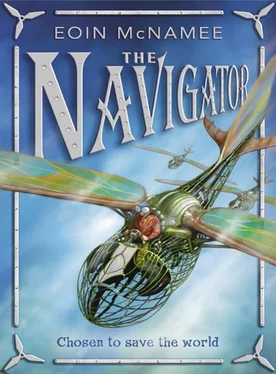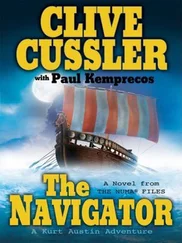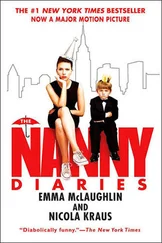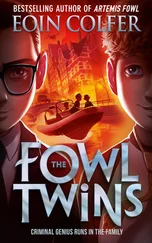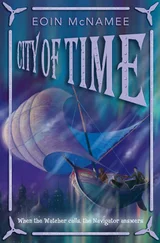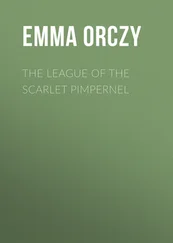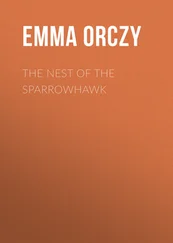“No ghosts,” she had said, giving him a strange look. “No ghosts at the Workhouse. But there are other things. That place has been there longer than anyone thinks.”
It took another ten minutes to reach the Den. Owen checked the entrance as he did every time. A whitethorn bush was bent across it, tied with fishing line. Behind that he had built up a barrier of dried ferns and pieces of bush. The barriers were intact. He moved them carefully aside and rearranged them behind him. He found himself in a clearing just big enough to stand in. The space was lit from above by the sunlight passing through a thick roof of ferns and grass so that it was flooded with greenish light. In front of him was an old wooden door he had pulled from the river after the Winter floods. He had attached it to the stone doorway of the Den with leather hinges, but it was still stiff and took all his strength to open.
Inside, things were as he had left them. The Den was roughly two metres square, a room dug into the hillside, its roof supported by old roots. The floor was earth and the walls were a mixture of stones and soil. Owen had found it two years ago while looking for hazelnuts. He had cleared it of fallen earth and old branches, and had put an old piece of perspex in a gap in the roof. The roof was under an outgrowth of brambles halfway up the steep part of the slope and the perspex window was invisible while still providing the same greenish light as the space in front of the door.
He had furnished the Den with a sleeping bag and an old sofa that had been dumped beside the river. There were candles for Winter evenings, and a wooden box where he kept food. The walls were decorated with objects he had found around the river and in Johnston’s yard a quarter of a mile away across the fields. Johnston kept scrap cars and lorries and salvage from old trawlers from the harbour at the river mouth. Owen had often gone to Johnston’s, climbing the fence and hunting through the scrap. That was until Johnston had caught him. He winced at the memory. Johnston had hit him hard on the side of the head then laughed at him as he ran away.
Before that, Johnston used to come to the house three or four times a year, selling second-hand furniture, but he hadn’t been back since he’d caught Owen.
But that had been last year. Now Owen had a lorry wing mirror, a brass boat propeller, a car radio cassette and an old leather bus seat with the horsehair filling poking through. He had also found an old wooden dressing table painted pink. He looked at himself in the mirror as he passed. A thin face, his hair needing a cut. He had a wary look. His eyes a little older than they should be. He made a face at himself in the mirror and the eyes came alive then, youthful and dancing. He let the mask fall again and saw the same watchful face looking back.
He spent as much time as he could at the Den. Sometimes, he felt that people were watching him, whispering that he was the boy whose father had killed himself. Suicide, that was the word he heard. He could see it in people’s eyes when he went into shops. A strange boy. One day he heard a woman whisper behind him. “Like father like son.” “He’ll go the same way,” another voice said. Sometimes it was just easier to stay away from them.
Owen sat down heavily on the bus seat. He knew he was in trouble. He’d skipped school again that week and spent his day around the harbour where the river met the sea. He couldn’t help it. He kept being drawn back. And yet when he got close to the edge of the dock, he could feel the terrible panic welling up in him. The coldness, the heavy salt greenishness of the water filling his mouth and his lungs, and then the terrible blackness below. Each time he would come to as if he’d been asleep, finding himself many metres from the edge of the dock, his limbs trembling and his mouth dry.
It had been like that for as long as Owen could remember. He wanted to ask his mother if he’d always suffered from such fear, but she seemed so weighed down and lost in her own thoughts that she barely noticed him these days, and when he did ask a question she raised dull, lifeless eyes to him, staring at him as if she was struggling to remember who he was.
That was the worst thing of all, so he had stopped asking questions.
Owen emptied his bag. In the kitchen he had found some cheese and some chocolate biscuits. He took a magazine from the small pile that he kept in the Den. The cheese was a little stale and tasted odd with the chocolate biscuits, but he ate everything and washed it down with the milk. Outside, the wind sighed through the trees, but the Den was warm and dry. These are the best times , he thought to himself. No one knew where you were, but you were safe and warm in a secret place that no one else knew about but you.
He had found the Den a few years ago, when things were normal, or almost normal. Those were the days when he could talk to his mother. About most things, anyway. Except, of course, when he had tried to talk about his father. She would open her mouth as if to reply, but her eyes would cloud over and she’d turn away. But at least then they had been happy, living together in the small house. “Me and you, son,” she would say. “That’s how it is, me and you.” And he had been glad to have her. In school he had always been a loner. Not that anyone actually bothered him much. They just seemed to think that it was better if he went his way and they went theirs. Fine with him.
But then his mother started to change. She said that something in the house was “weighing on her”. That there was something in the air itself that left her unable to think straight. She started to forget things. Little things at first, then it seemed as if she forgot almost everything, wandering through the house, vague and forgetful.
Owen read on until the light changed, almost as if a rain cloud had arrived overhead, the light dark but silvery, so that he could still see the letters on the page. He listened for the sound of the rain falling, but there was nothing, not even the sound of the wind. In fact, a stillness seemed to have fallen outside, so complete that you couldn’t hear the sound of birds or insects. Owen decided to investigate. He slipped on his jacket and heaved the old door open. He was careful to replace the branches that hid the door, even though he was aware of their loud rustling in the still air. He paused. There was a sense of expectancy. He began to climb towards the old swing, which was the highest point overlooking the river.
It took ten minutes to get up to the level of the swing tree. The air itself was dense and heavy, and Owen was breathing hard. He skirted the ridge until he got to the swing. It was a piece of ship’s cable which had been hung from the branch of an ancient oak protruding over a sheer drop of fifty metres to the river. The rope part of the cable had almost rotted away to expose the woven steel core. No one knew who had climbed the branch to put the cable there, but Owen knew what it felt like to swing on it. It was both terrifying and exhilarating. You knew that if you lost your momentum or your grip there was nothing to save you from the long drop to the stones of the river far below. Local children had used it as a test of nerve for years. For Owen, it wasn’t the bone-crunching impact of the stones that he feared, but the clammy touch of the water.
For some reason he couldn’t explain he felt that there was someone watching. Almost without thinking, he crouched down behind a heap of old stones and peered out over the river. As he did so he saw a part of the bank below him start to move. At least he thought it was part of the bank, but as he looked closer he saw that it was in fact a man. He was wearing some kind of uniform, which might have been blue to begin with but was now faded to a greyish colour. There were no insignia on the uniform except for heavy epaulettes on the shoulders. The man’s hair was close-cropped and steely grey. In one hand was a narrow, metallic tube, almost gun-shaped, and on his belt there were oddly shaped objects – thick glass bulbs with narrow, blunt, metal ends.
Читать дальше
